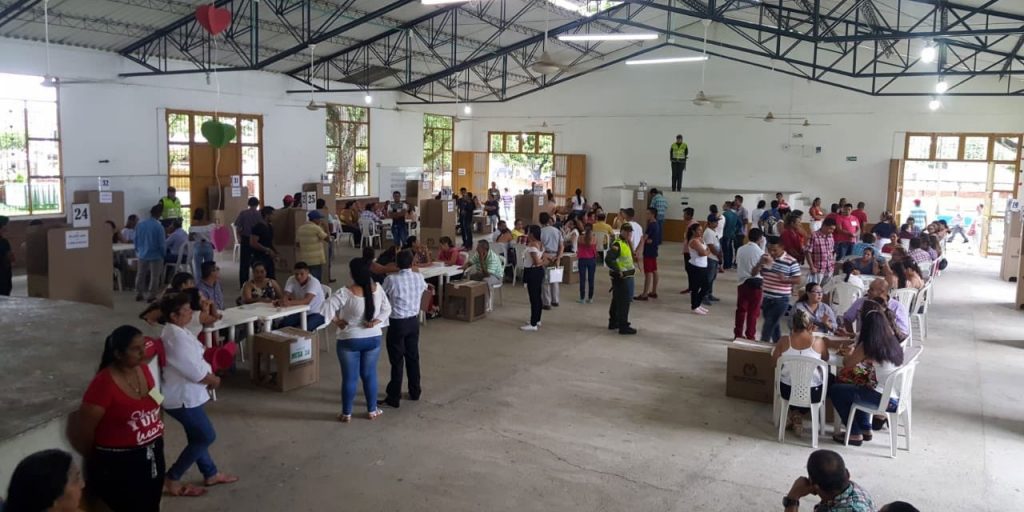Colombia on Sunday elects a president who inherits a fragile peace process, record cocaine production and street crime levels, and high unemployment.
Two men have asked the Colombian people for this job: the conservative Ivan Duque, who has never held a leadership position in his life, and Gustavo Petro, a former guerrilla with a temper.
Keeping the peace
The biggest concern is that the next president will not be able to keep the peace that was agreed to by between outgoing President Juan Manuel Santos and the FARC guerrilla group after years of negotiations.
The political patron of front-runner Ivan Duque, former President Alvaro Uribe, has been opposing peace with the guerrillas ever since talks began in 2012, and for good reasons; he and many of his allies could end up in prison over war crimes.
Uribe is being investigated for homicide and the International Criminal Court is investigating dozens of top military commanders for their alleged role in the mass execution of civilians.
Duque’s plans to unilaterally change the conditions of the 2016 peace deal could spur the rearmament of many FARC guerrillas. Conditions he vowed to impose on talks with ELN rebels are likely to end talks and restart violence.
Opponent Gustavo Petro is a former M-19 guerrilla who has vowed to defend the peace process, and seek justice for the millions of victims left by the FARC, the military and the paramilitary groups once promoted by Uribe.
Petro, however, has virtually no support in Congress. His confrontational style could cause major tensions with corrupt oligarchs he has been confronting for decades.
But the biggest problem for both candidates is the executive branch over which they hope to preside. The state system has been crippled by corruption and is barely able to carry out common law enforcement duties, especially in rural areas.
Violence is already on the increase in former FARC territories, mainly because paramilitary groups and rogue guerrillas are trying to usurp the FARC’s abandoned criminal rackets.
More than 280 social leaders have been assassinated, many of whom working to promote peace in their regions.
A resurgence of the FARC is unlikely; they surrendered most of their weapons and no longer have the military capacity to pose a threat. The paramilitary groups and the ELN, however, could plunge the country into a new phase of political violence.
Create jobs
Colombia has traditionally been one of Latin America’s countries with the highest unemployment rate.
Santos was able to lower the rate to below 10%, but whether this is sustainable remains to be seen.
Previous governments’ priorities were the creation of economic opportunities in the oil and mining sectors. Not only do these sectors barely generate jobs, they threaten job-creating industries like manufacturing, the service sector and agriculture.
Duque’s proposal to create jobs has been bashed by economists as it, again, focuses on mining and large-scale agriculture, sectors that hardly generate employment.
Petro’s proposal to diversify the economy has been praised by both national and international economists, but has left one question; how to secure government investment for job-creating sectors if the country is almost broke?
Drug trafficking
Not everybody is ready to admit it, but the war on drugs is lost. Cocaine production in Colombia in 2016 was seven times higher than in 1993, the year that Pablo Escobar was killed.
The United States has spent billions of dollars in aggressive methods to reduce the cultivation of coca, the base ingredient for cocaine, but has failed to reduce consumption at home.
Cocaine consumption in the rest of the world also seems to have increased, and is creating a source of revenue for more than 100,000 farmers, countless farm-workers and, of course, drug trafficking groups.
As part of the peace process, the Colombian government has kicked off a program that seeks to reduce the dependency on the illegal economy through economic development; much of Colombia’s cocaine is grown where no other economic activity is realistic.
This program, however, is opposed by drug trafficking groups who have killed more than 200 people who wanted to remove their coca. State security forces have been unable to provide security in these remote areas.
Duque has refused to support the peace process. It is uncertain whether he will continue the economic development recommended by the United Nations.
Petro has proposed increased development in the countryside, but this is likely to cause conflict with the wealthy landowners who have benefited from the war by stealing displaced farmers’ lands.
Urban security
Urban crime has been skyrocketing under Santos.
As part of the peace process with the FARC, many policemen were sent to areas that were previously controlled by the guerrillas. This territorial reorganization, however, has not gone as planned.
While failing to improve security in the countryside, many of the country’s largest cities have seen major spikes in street crime.
Venezuela
If you thought the situation in Colombia was delicate, look east where the Venezuelan state appears to be bordering collapse.
More than a million Venezuelans have fled their country over the past year and a half. Many of them are in Colombia.
This hardly regulated influx of Venezuelans is causing major tensions with locals. Because aid is insufficient, many migrants are employed well under minimum wage or even resort to crime.
Pamphlets threatening to kill Venezuelans have already been going around in areas where migrants from the neighboring country have been gathering. Colombia’s next president will not be able to do much about the situation in the neighboring country other than hope it improves.


